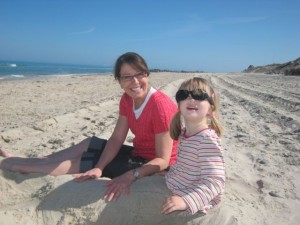Why Your Dog Is Happier Than You Are

The door’s opening!
Story 1: When I come home, I open the front door and our dachshund, Bella, comes racing through the house, throws herself at my feet, rolls over for a belly rub, and wags her tail vigorously. It doesn’t matter if I’ve been outside for a few minutes or away on a business trip for a few days. Bella’s reaction is always the same – she’s thrilled to see me.
Story 2: Suellen and I enjoy art and we’re friends with several artists, so we have a lot of artsy things – photographs, etchings, a few paintings, and sculptures. Some of it is pretty good stuff. Even the not-so-good stuff has lots of sentimental value. I notice, however, that I don’t notice the art so much. I can walk through the house without registering that it’s filled with art. It’s almost like wallpaper.
Why is it that Bella gets excited just by hearing the door creak open while I can blithely ignore some very stimulating art? I think it’s because of hedonic adaptation. I have it. Bella doesn’t.
When we acquire a new piece of art, I pay a lot of attention to it. I may study it, talk about it, maybe even brag about it. It’s new and different and it stimulates me. After a few months, however, it’s just part of the new normal. I still like the piece but it doesn’t stimulate me. I’ve adapted to its presence. That’s hedonic adaptation (or the hedonic treadmill as it’s sometime called).
Bella, on the other hand, doesn’t seem to grow accustomed to the same old thing. Everything seems new to her all the time. The door creaks and off she goes to a new adventure. At the very least, she’ll get a belly rub. She might even get a treat. Oh, it’s so exciting!
There’s a subtler difference as well. Art is a thing, something to be owned. An opening door is an experience: who knows what will happen? There’s a bundle of evidence that experiences generate more happiness than things. If you want to improve your general level of happiness (and perhaps get off the hedonic treadmill for a while), invest in doing things rather than buying things.
I’ve written about happiness before (click here and here and here). There’s a rising tide of research on Gross National Happiness and a suggestion that we over-emphasize Gross National Product in public policy. For instance, American wealth has tripled in the past half century but we haven’t gotten any happier. Relative wealth seems more important than absolute wealth.
What about at the personal level? The best advice seems to be to invest in small experiences. Why small rather than big? Because you can do them more often. Frequency seems to be more important than size. There’s a novelty factor that seems to intrigue and stimulate us. Bottom line: do more things, buy fewer things. Oh, and get a dog.
Gross National Happiness

We’re happy in Denmark.
What’s with these Danes? On virtually every survey that purports to measure national happiness — or Gross National Happiness — Denmark scores number one. In fact, the Nordic countries — Denmark, Finland, Iceland, Norway and Sweden — typically occupy half of the top ten “happy slots”. I’ve visited all the Nordic countries. They’re really nice but are they the happiest places in the world? Wasn’t Hamlet Danish? He didn’t seem so happy.
As you may have guessed, I’ve been reading the World Happiness Report published through The Earth Institute at Columbia University. (Click here). It’s about 170 pages long and makes for very interesting reading — enough so that I’m going to write about various facets of it from time to time. Here are some of the key questions:
- Is happiness a topic that we can take seriously? According to the study’s authors, there is enough empirical research coming from many different cultures that we can start to make useful comparisons and judgments. I’ll admit that I’m very curious about how to measure national happiness, so I’ll write about the method as well as the results.
- What makes people happy? Money helps but not as much as other factors like social cohesion, strong family ties, absence of corruption, and degree of personal freedom. Interestingly, giving money away seems to make people happier than receiving money.
- As countries get richer, do they get happier? Some do and some don’t. Apparently, the USA is one of those countries that hasn’t gotten happier as we’ve gotten richer. I’d like to dig into that.
- Is the world getting happier? Apparently we are, especially in areas where extreme poverty is being eliminated.
I’ll write occasionally on happiness studies and delve into what makes people happy and what doesn’t — and how all this affects the way we live. Feel free to send me any of your questions about happiness studies and I’ll try to get them answered.
In the meantime here are two questions for you:
- Taking all things together, how happy would you say you are? (0 = extremely unhappy; 10 = extremely happy)
- All things considered, how satisfied are you with your life nowadays? (0 = extremely dissatisfied; 10 = extremely satisfied).
In the Nordic countries, the average life satisfaction score is 7.6. If yours is lower than that, maybe it’s time to head to Denmark.